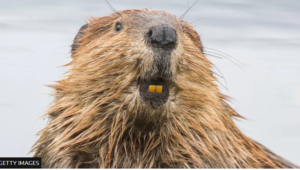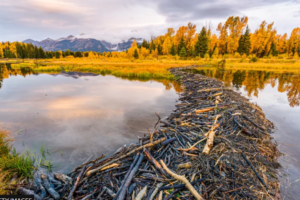Some excellent beaver reporting on the BBC this morning, Sunday appears to be beaver day for some reason. It makes me wonder whether news organizations actually read all the articles they reported previously about a single topic over the year, tally up the good news, or if it just slips their minds completely and slips away down the memory hole. I mean do they even remember Alex Riley saying calling the beaver an “ecosystem” not an animal?
How beavers are reviving wetlands
 We are losing wetlands three times faster than forests, according to the Ramsar Convention on Wetlands. When it comes to restoring them to their natural state there is one hero with remarkable powers – the beaver.
We are losing wetlands three times faster than forests, according to the Ramsar Convention on Wetlands. When it comes to restoring them to their natural state there is one hero with remarkable powers – the beaver.
Wetlands store water, act as a carbon sink, and are a source of food. The Ramsar Convention on Wetlands says they do more for humanity than all other terrestrial ecosystems – and yet they are disappearing at an alarming rate.
The main problems are agricultural and urban expansion, as well as droughts and higher temperatures brought about by climate change.
But if you have a river and a beaver it may be possible to halt this process.
These furry sharp-toothed rodents build dams on waterways to create a pond, inside which they build a “lodge” where they can protect themselves from predators.
Their technique is to chew tree trunks until they fall, and to use the trunk and branches as building materials, along with stones at the base, and mud and plants to seal the dam’s upstream wall. The dam causes flooding, slows down the flow of water and keeps it on the landscape longer.
“This transforms simple streams into thriving wetland ecosystems,” says Emily Fairfax, an ecohydrologist at California State University. “The amount of food and water available in their wetlands makes them ideal habitat for many different species. That’s part of why beavers are what’s known as a keystone species.”
Thank goodness for Emily out there on the front lines talking beavers to anyone and everyone that will listen. I can only hope that by now she has inspired a dozen students to follow in her footsteps.
But the restoration of wetland ecosystems has also brought huge biodiversity benefits, including the return of many species of frogs, fish and invertebrates.
A study by Finnish researchers in 2018 found that ponds engineered by beavers contained nearly twice as many mammal species than other ponds. Weasels, otters and even moose were all more prevalent.
“Beaver wetlands are pretty unique,” says Nigel Willby, professor of freshwater science at University of Stirling.
“Anyone can make a pond, but beavers make amazingly good ponds for biodiversity, partly because they are shallow, littered with dead wood and generally messed about with by beavers feeding on plants, digging canals, repairing dams, building lodges etc.
“Basically, beavers excel at creating complex wetland habitats that we’d never match.”
I really really like that. Any Tom, Dick or Harry can make a pond. But it takes a BEAVER to make a habitat.
Fairfax and her team studied 10 different wildfires in five US states between 2000 and 2021 and found in each one beavers and their ecosystem engineering reliably created and preserved wetland habitat, even during megafire events.
“Beaver wetlands have a lot of stored water, so plants in them don’t really feel droughts, they stay green and lush. And when wildfire came through, they were not burnt and we found that they stayed well-watered.”
But experts say beavers are only part of the solution to restore wetlands. Other necessary measures include planting woodland along the banks of lakes and rivers, and restoration of peatland and saltmarsh, says Prof Willby.
And that’s the that, as they say. Keeping plants moist with access to all the water they need makes it harder for fire and drought to do damage. I always thought it would be salmon magic that changed the status of beavers in California, but it turns out there are more people who don’t want their homes to burn down than there are salmon fishermen in the state. Who knew?
 Barron Joseph Orr, lead scientist with the United Nations Convention to Combat Desertification, says wetlands are often resilient ecosystems, but prolonged droughts now pose a growing threat.
Barron Joseph Orr, lead scientist with the United Nations Convention to Combat Desertification, says wetlands are often resilient ecosystems, but prolonged droughts now pose a growing threat.
“Climate change projections show increased drought severity in drylands that could compromise wetland resilience and reduce important habitat services,” he says.
In other areas too, drought can damage wetlands, but the beaver can help protect them. There have already been more than 100 successful reintroduction projects in North America and northern Europe.
In Europe the population is believed to have tripled in the last 20 years, according to Prof Willby, with beavers now re-established in most European countries. Sweden, Germany and Austria led the way, according to the Natural History Museum, but the UK followed in the early 2000s.
“The early motivation for bringing beavers back to the UK was mostly about playing a part in restoring a declining species to its native range,” Prof Willby says.
“But the value it could have as a keystone species for other biodiversity and in natural flood management was gaining a lot more traction, and these are the arguments usually put forward now to support the local releases of translocated animals or fenced trials happening in many places.”
Sure first we wanted to bring them back just because they were ours and furry and stuff, but now it turns out they’re REALLY useful! The entire British Nation is so surprised! Well, except for the anglers, but they’re never happy.
Nice report out of Utah last night too, they are definitely catching on.






































